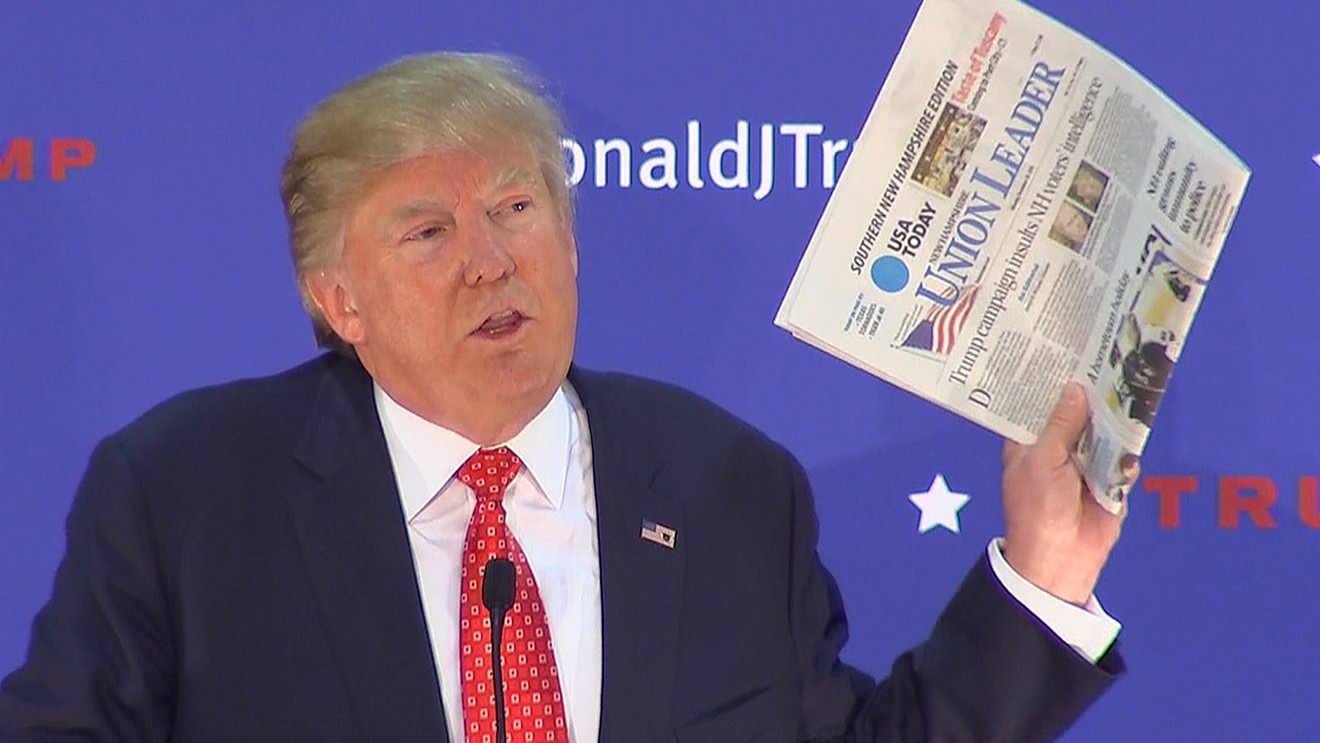The Sentinel has announced that on August 13, it will stop publishing physical versions of its work on Monday and Tuesday in favor of e-editions online, and publisher Jay Seaton says that tariffs imposed by Trump on Canadian groundwood paper used to make newsprint represent "the straw that broke the camel's back for us."
Seaton, whose publication generally takes a conservative editorial stance, stresses that "I'm not going to lay our entire decision at the feet of the Trump administration," and that's appropriate. As he notes, "The trend that led to this has been continuous."
True enough. Rising costs for printing and distribution, coupled with advertising revenues that are "down 75 percent nationwide," by Seaton's measure, have caused daily newspapers to make desperate decisions to keep their lights on. Look no further than the Denver Post, which has slashed its newsroom staff from around 310 to seventy or fewer over the course of a decade or so at the behest of Alden Global Capital, its profit-addicted hedge fund owner.
This approach to dealing with economic realities is the wrong one, in Seaton's view.
"I'm very disappointed in what the Denver Post has done," he says. "That's the last thing we want to do here."
After all, he adds, "our mission is a First Amendment mission, and it's vital we continue to exist not only for our community, but for our industry. So we have to find a way to thread that needle so we can continue to serve our mission on lower revenues."

A look at page one of the July 17 e-edition of the Grand Junction Daily Sentinel.
Grand Junction Daily Sentinel
"I think the number of people in our newsroom exceeds in number those in all the TV station newsrooms combined," he allows. "So the burden of covering this community in a tip-to-tail way is on us. There are a lot of expectations for a community newspaper like this, and if we are going to continue to serve, we have to look for all the efficiencies we can grab."
Hence the decision by the Sentinel brain trust to put a paywall around its editorial content. But Seaton admits that this approach hasn't solved the paper's problems: "I have doubts about the model even though we're using it. ... But nobody's really figured out the paywall yet. We made a huge mistake in this industry twenty years ago when we decided to give away our news information on the Internet. We trained people to expect that they wouldn't have to pay for news information, but trust me, it's very expensive to do good journalism. So everyone's trying to put the toothpaste back in the tube, but nobody's really got it dialed in yet."
To Seaton, an e-edition represents a promising middle ground. On Mondays and Tuesdays, he says, "we're going to mock up the paper and produce a product that's a digital replica of what would be a printed newspaper," complete with ads. "But by distributing it digitally, we'll avoid all the costs of production, which are significant portions of a newspaper's expenses."
Just as important, he continues, "I feel that the e-edition is the best way to consume a newspaper online. The Internet itself is clunky, and you're not typically exposed to stories you wouldn't ordinarily take an interest in the way you can if you turn the pages of a newspaper. And a newspaper that's laid out in an editor's-intelligence-inserted format is still the best way to consume news information."
Convincing Sentinel subscribers — particularly those typical of Grand Junction's older-skewing demographic — that they won't be missing anything on Mondays and Tuesdays won't be easy, Seaton concedes. That's why the Sentinel is making its e-edition free for the rest of this month — click to see today's version — prior to limiting access to subscribers. Additionally, Sentinel reps plan to host seminars at Grand Junction's main library to "show everyone how to walk through the process of setting up your log-in information, logging in and accessing the e-edition," Seaton says. "Because we don't want to lose all those folks. We want to hang on to them despite the fact that we've gone to digital delivery two days a week."
No one can know for certain that the experiment will work, but plenty of newspapers are trying variations on it. The Durango Herald went to a four-day-a-week publication schedule last year. And in June, the sizable Pittsburgh Post-Gazette announced that it wouldn't print two days per week beginning in August.
Still, Seaton says, "we're one of the first communities to adopt this change, and since the pioneers get the arrows and the settlers get the land, we're going to get a lot of arrows. But there will be a whole lot of newspapers following what we do — I guarantee it."













